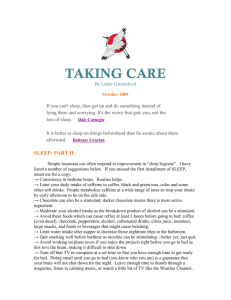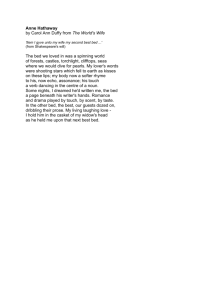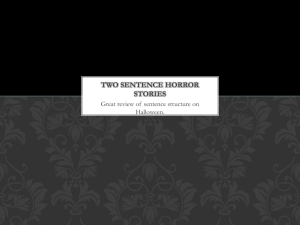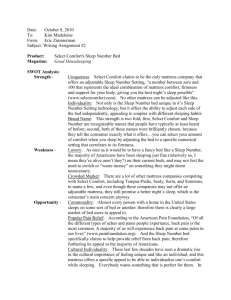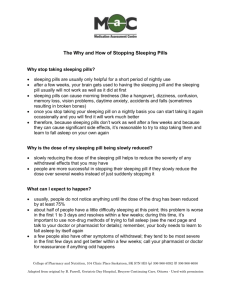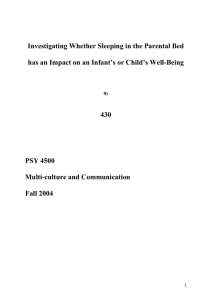short story (ficiton)
advertisement
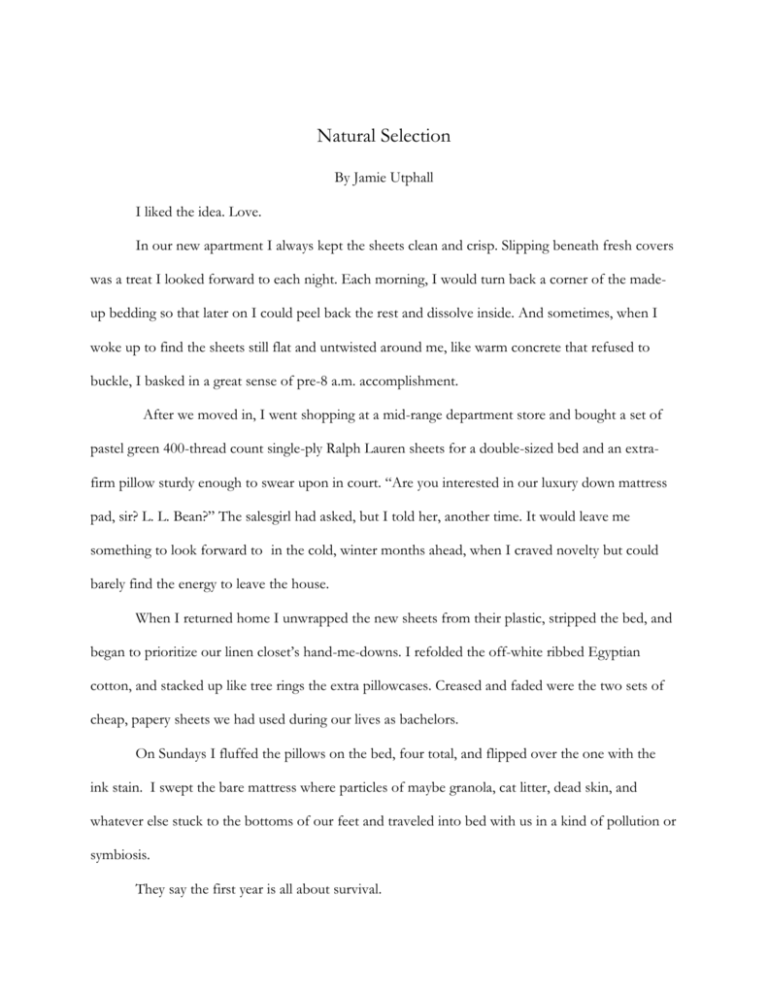
Natural Selection By Jamie Utphall I liked the idea. Love. In our new apartment I always kept the sheets clean and crisp. Slipping beneath fresh covers was a treat I looked forward to each night. Each morning, I would turn back a corner of the madeup bedding so that later on I could peel back the rest and dissolve inside. And sometimes, when I woke up to find the sheets still flat and untwisted around me, like warm concrete that refused to buckle, I basked in a great sense of pre-8 a.m. accomplishment. After we moved in, I went shopping at a mid-range department store and bought a set of pastel green 400-thread count single-ply Ralph Lauren sheets for a double-sized bed and an extrafirm pillow sturdy enough to swear upon in court. “Are you interested in our luxury down mattress pad, sir? L. L. Bean?” The salesgirl had asked, but I told her, another time. It would leave me something to look forward to in the cold, winter months ahead, when I craved novelty but could barely find the energy to leave the house. When I returned home I unwrapped the new sheets from their plastic, stripped the bed, and began to prioritize our linen closet’s hand-me-downs. I refolded the off-white ribbed Egyptian cotton, and stacked up like tree rings the extra pillowcases. Creased and faded were the two sets of cheap, papery sheets we had used during our lives as bachelors. On Sundays I fluffed the pillows on the bed, four total, and flipped over the one with the ink stain. I swept the bare mattress where particles of maybe granola, cat litter, dead skin, and whatever else stuck to the bottoms of our feet and traveled into bed with us in a kind of pollution or symbiosis. They say the first year is all about survival. As a rule, I alone made the bed because I was convinced this was an act only complicated by collaboration, and, at that time, it was important for me to feel the gratification of seeing a task through, beginning to end. I kept a half-glass of water on my nightstand and always ate a sugary snack before bed, as children do—toast with jam, a cookie, or a small bowl of yogurt. Later it became almost impossible to sleep without this, and so after dinner I set out the dish or the utensil needed, and all throughout my post-dinner activity, grading papers, running an errand, or walking around the block, I would look forward to the extra glucose. “Aren’t you worried you’ll gain weight?” you said, slipping out of your boxers. But from Sunday to Saturday, one evening winding down and recoiling into another, I told myself you found my attention to habit somewhat endearing, especially when compared with the torrents of your own dullness. How could anyone not find apathy so overwhelming? But some nights when I peeled back the covers, I had the distinct feeling I might die within the night, and strangely, the person I imagined finding my body was never you, the obvious choice, but an acquaintance or often times a stranger—how would they get into the house?—who would not arrive until days later to find my corpse, draped in wrinkled linens. Once, it was a quiet girl who smelled like chlorine who had sat next to me in 10th grade geometry. Another time it was Vince Lombardi, who grinned with his hands clasped, wringing them shoulder to shoulder across his boxy chest. Vince Lombardi? However illogical, these rescuers would hover in the space just beyond my wakefulness, and without invitation, usher me into the comfort of a temporary death. This is a story about surviving. Fall fused icily into winter, the days grew shorter, and my bedtime crept and rivaled dinner, as if the ritual of sleep were my one and only sustenance. Like a biologist preparing for dissection, I took pride in arranging everything just so, including my own limbs. They say one’s sleeping posture reveals deep yet essential secrets about one’s mental state. Those who sleep on their stomachs have something to protect, and those who sleep on their backs with their elbows and palms at their sides have the most confidence. My natural sleeping posture combined the fetal position with an upsidedown version of how, at age nine, I had been taught to properly slide into home plate, my legs mimicking the shape of the number four. I had not thought a lot about what this posture said about my inner child, or my relationship with my mother, or the tension my body type carried in the muscles of the lower back. How could I? One’s sleeping position is determined by an endless, myriad of such external factors, including but not limited to: digestion of a heavy meal, lack of stretching after exercise, how long or how much one had already slept that day, the stress-level of events occurring immediately prior to sleeping, the stress-level of events occurring immediately after sleeping, the stress-level of events occurring at any time within the near or distant past or future of sleeping, the temperature of the room and amount of blanket coverage, jetlag, drunkenness, or daily caffeine intake, post-coital fatigue (which is said can be deadly among squids), and of course, the sleeping postures of participating organisms. And then sometimes there were the pitiful, insomnious nights, hopelessly perforated by trips to the toilet, to the fridge, or the couch. Such nights hung together in one liquid, long week of torment. And what I would never openly admit, sleep always carried with it its own mysterious rules of bodily routine or renewal, which harnessed themselves to that First Year in ways I could never even begin to understand. All rituals have a way of making certain things disappear. Before the alarm clock rang on February 12th, at 4:19 A.M., I waited with my hands folded. The sky would not brighten for hours, until after the school day had already began, and so I lay there, waiting, as if riding the bus, content with letting only time do the worrying. At first, I didn’t recognize the voice speaking. Its sound was more like the feeling of scanning your eyes across pages and pages before realizing you hadn’t actually comprehended a single word of what your eyes had passed over. Slowly, over the next few seconds, the speech began to take shape, and I began to observe its predicates and articles. Unmistakable syntax. One-hundred percent grammatical sentences spoken by a one-hundred percent real voice. I reached for my glasses. The voice was like a kind of third party, a friendly neighbor who sometimes struck up a conversation, by unlatching your back door without knocking, or by poking his head over the hedge when he saw you working out in the back yard. Whether this neighbor-figure had been invited was of little consequence. He was both well known and anonymous, trusted yet mysterious. There was comfort in that only something concrete would bring forth his need for contact, such as a relayed message from the water meter reader or the endlessly volleyed favor of mowing the conjoined boulevard. I had, I admit, made the habit of avoiding this said neighbor, and only carried on the most reluctant small talk, to the point where I had caught myself repeating “and how are you?” a second time, which marked my inattention with bright, neon lights. This man should already know I wanted nothing. But sometimes maintaining a façade is easier than not. “Do you think,” he began, “ they make cat houses on blimps?” His subject then, became more or less clear. I looked at the ceiling and cleared my throat. There was something troubling in the man’s voice, and whatever tension was gripping him, I knew I didn’t want to get too involved. “They let people smoke on the Hindenburg,” he continued, “so don’t tell me it’s out of the question. Everybody nowadays assumes the answer’s obvious, but it’s not too difficult to remember a time when it wasn’t.” “Why’s that?” I said. The words felt fuzzy and fermented in my mouth, so I lay there, rehearsing infinitives: to floss, to brush, to put on the coffee. Morning was all about efficiency, not manners. He didn’t respond. The darkness between us was like a brown picket fence. Then the pillows separating us arched upward, in the shape of brown fence posts, as if we were on an episode of Home Improvement. His breathing changed, and for a moment I thought I was off the hook. “Give me a break. It’s not just about knowing and not-knowing. We’re talking about a set of conditions—expectations, really—that with ample preparation are nearly absolutely predictable.” He was right. There really was no reason you couldn’t take a cat house on a blimp. But I wasn’t about to give him the satisfaction. Do that, and the next time he popped his forehead up over the fence I’d be subjected to his theory about the history of mispronounced Italian in the American restaurant industry. I wasn’t about to act interested. “Nothing you say or do will make me unlovable,” he said next. I paused, thinking. I didn’t have an argument for that one. My judgment seemed clouded by either too much or lack of information. It’s hard to argue with someone you’ve let become mostly invisible. “I’m going to be late for school,” I said. It was still hours before sunrise. But the urge to flee, to escape, had been programmed into my muscles, so much so that at that very moment the worry that I would somehow miss first period altogether seemed deeply probable and real. In my head I rehearsed what the next few seconds would bring, me emptying the bed and smoothing out the covers. “You’ll probably ask if we can talk about this later” he said. “There’s no way you could not know this already, but you’re not in trouble and I can’t help you. That’s the good news.” I was quiet for more than a minute, my thoughts folding and refolding linen. “Is it?” I said. It was dark, but I imagined him waving a little perfunctory salute from behind the fence. “Goodnight,” he said. “Have a good day at school.” “Good night,” I said. When my feet hit the carpet, I realized we had somehow sailed into morning on our last thin sliver of compromise. Thinking about making and re-making the bed to achieve large swaths of uninterrupted sleep is one way to measure time. But there are others. Sometimes I wonder what happened to Wilson. The thought usually pops into my head as I’m stripping off week-old sheets like birch bark. After Wilson crept back behind his fence—did he disappear forever?—drowned and forgotten inside that mattress?
